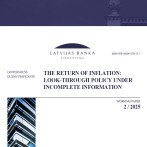The annual inflation in December again down because of dropping oil prices
The average annual inflation of 2014 was 0.6%, which is one of the lowest levels in a growing economy in Latvia, and it was caused, to a large extent, by external factors.
The December 2014 inflation was primarily impacted by a drop in global oil prices, whose direct and indirect influence brought down fuel as well as thermal energy prices. The annual inflation thus shrank to 0.2%. The development in the prices of other consumer goods and services failed to compensate the impact of the drop in energy resource prices, in part because energy prices did not exert a cost pressure in other industries.
The global oil prices in December continued to drop sharply, and the monthly decrease in fuel prices in Latvia reached a new record since December 2008, i.e. 6.5%. Because of oil prices, as expected, AS "Latvijas Gāze" published new natural gas tariff projections for the industrial consumers (including many producers of thermal energy). They mark the falling trend in thermal energy prices up to March, and even steeper in March than in January and February. The world food prices also dropped both in December and in 2014 overall. Thus these global price factors, along the weak growth and low inflation in the euro area were the main factors that reduced inflation in Latvia in 2014.
The weakening euro meanwhile acted to slightly reduce the negative contribution of oil prices to inflation. Domestic factors, such as the rise in indirect taxes (tobacco excise tax), rise in some regulated prices (water and sewerage tariffs) as well as, to some extent, a gradual rise in income and the impact of one-off costs of euro introduction also constituted a positive contribution.
In addition to the reducing influence of global factors on inflation, seasonal factors acted in the same direction (with a slight delay or more intensely): in December, on a larger scale than previously, footwear sales began, with prices decreasing by 7.2% as compared to November. Yet during the December holiday season, while the prices of food and beverages as well as those of wearing apparel, footwear and transport services dropped, the unregulated service prices did not lose their impact. It may have been because the consumers could allot a slightly larger part of expenditure for them and thus maintained demand.
Service prices may have also created an increase in perceived inflation. Inflation expectations in December grew for a third consecutive month and, interestingly, the evaluation of perceived inflation increased despite the dropping energy prices. Some role in this may have also been played by 15 December as the date by which the power supplier had to have been chosen. Yet energy prices in the inflation of 2015 might have been both the raising and lowering factor. In January 2015, oil prices continued to drop, with Brent oil prices dropping below 50 U.S. dollars per barrel; therefore, the prices of energy resources related to oil products continue to go down and the average annual inflation of 2015 may not reach the level predicted in December.
Textual error
«… …»






